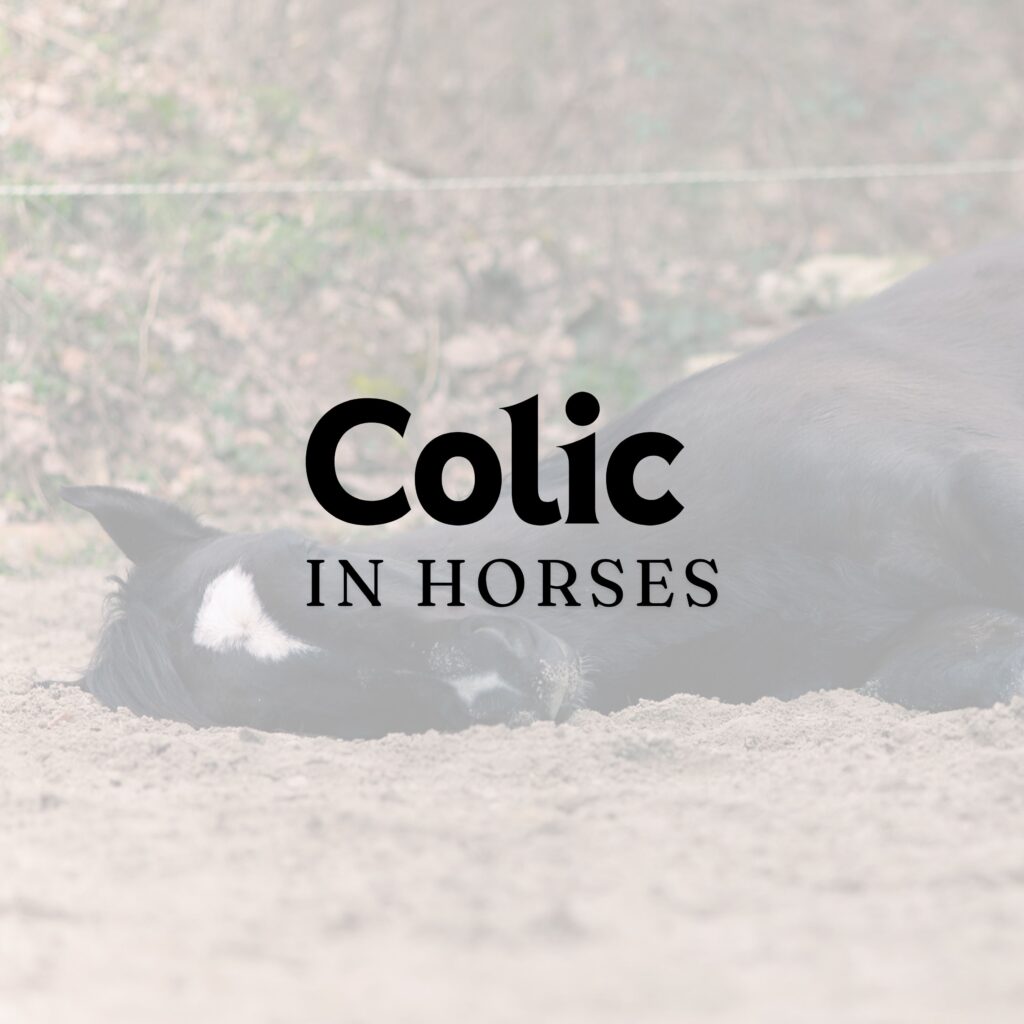Colic in Horses

What is colic?
The term “colic” simply means abdominal pain. There are many causes of colic and symptoms range from very mild to violent.
What are the symptoms?
A horse with colic will show varying symptoms depending on the cause of the colic, how long it has been present and the stoicism of the patient. Mild colic symptoms include dullness, curling up of the top lip, adopting a ‘straining to urinate’ stance and lying quietly. Severe colic pain can cause a horse to roll and throw itself about in an uncontrolled and dangerous manner.
What causes colic?
Colic can be due to something as simple as a gut ‘spasm’ resulting from a change in diet or routine i.e., a digestive upset or as serious as twisting of a part of the intestine with consequent strangulation of its blood supply. The more common causes include impaction (where the intestine becomes clogged with semi-digested food material), displacement of a segment of bowel from its normal position, torsion or twisting, strangulation through hernias or holes, strangulation by fatty tumors wrapping around them and other causes of obstruction.
How is colic treated?
Different types of colic require different treatments, so an accurate diagnosis is the first step. Simple large colon impactions usually respond to treatment by lubrication with oil, salt and water given by stomach tube. Many cases respond quickly to analgesics (pain killers) such as ‘Buscopan’ (a spasmolytic) and flunixin (Banamine). Some cases require urgent aggressive treatment – either medical or surgical, if the horse’s life is to be saved.
There are some colic’s that can only be treated by operating to correct the underlying problem.
What should I do if my horse has colic?
Call your veterinarian immediately and explain the symptoms. Persistent severe pain usually indicates a serious problem and an emergency situation. If possible, keep the horse walking but do not attempt to take the horse out of its stall if it is in uncontrollable pain. Remember that the key to success with colic is early diagnosis and treatment. It is better that the horse has recovered when the veterinarian arrives rather than at “death’s door” after waiting too long before seeking help.
How can a vet tell what is causing the colic?
In addition to straightforward clinical examinations of the horse’s behavior, attitude, temperature, pulse and respiratory rates and mucous membrane color, veterinary investigations such as rectal examination, taking blood and peritoneal (abdominal) fluid samples, ultrasound scanning and passing a stomach tube can all give indications of the type and severity of the problem. It is not always easy to establish the exact problem and in some cases, surgery is needed to allow examination of the abdominal cavity (exploratory laparotomy) to pinpoint the abnormality as well as to allow correction or treatment. In many cases your veterinarian will quickly determine whether your horse is ‘surgical’ or not, and recommend the appropriate action, that may be referral to a specifically experienced veterinary clinic. In all cases, the earlier the decision can be made as to whether medical or surgical treatment is needed and that treatment is begun, the better the horse’s chance of survival.
Can I prevent my horse from getting colic?
To a certain extent – Yes. Regular deworming to prevent damage to the intestine and its blood supply helps enormously. Keeping to a routine and avoiding sudden changes in management and feed type also helps. Horses and particularly their intestines are creatures of habit. Changes should be made gradually and carefully. Horses who are injured or having a break from exercise should not be bedded on straw. Many will eat their bedding and their large intestines will become impacted with this. This can be prevented by bedding them on shavings, paper or other non-edible materials. They should have unlimited access to drinking water and, if possible, some exercise. Nevertheless, some cases of colic are neither preventable nor predictable. You must be alert to any changes in your horse or pony’s health.
Contributors: Deidre M. Carson, BVSc, MRCVS & Sidney W. Ricketts, LVO, BSc, BVSc, DESM, DipECEIM, FRCPath, FRCVS.
Edited by Kim McGurrin BSc DVM DVSc Diplomate ACVIM
© Copyright 2010 Lifelearn Inc. Used and/or modified with permission under license
.

